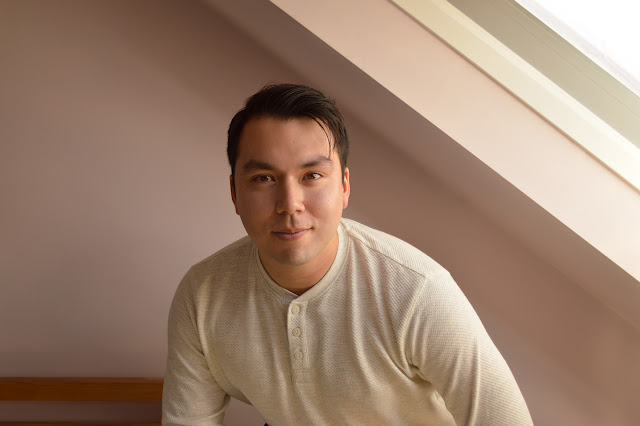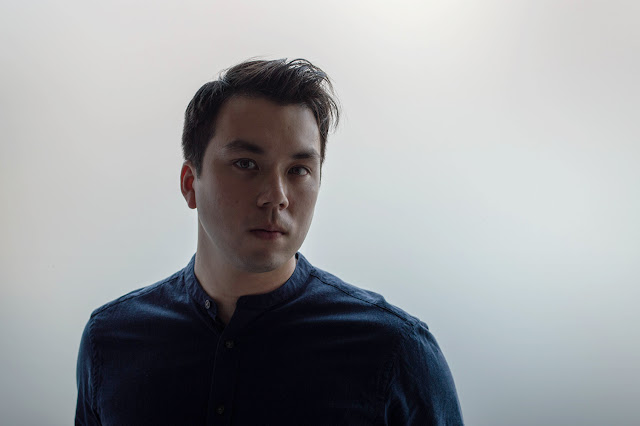 |
| Andrew Chen |
Andrew describes his music as being fluid, focused on distinct shapes with blurred edges, and working with timbres and textures. He had to find a different way to work with the piano trio with the three instruments being naturally such distinct characters. So, in the piece, each instrument takes on its own character and agency, with freer sections which are less structured, each instrument in a different time, but there are also moments where the three come together. He describes the sound world as slightly cold, but still familiar. The work starts with an extended piano solo before sudden interjections from the other instruments, and the overall tone he describes as unsettled, but not too harmonically out there, and there are momentary connections of consonance against the unsettled background.
Growing up, he was a big Rachmaninov fan, as well as being a budding young pianist, so for a long time, the Rachmaninov piano trios were his favourite chamber pieces. Now, he has decided to do something that sits a bit further away from tradition, but there will still be some connection.
For the choral piece, the performers and the venue mean he has a different approach. Merton College Choir has a repertoire which is often liturgical whilst the premiere takes place in the context of a classical mix-tape event at Gloucester Cathedral, so he has taken a more amicable approach to the writing. And, of course, he is also bound by the limitations of the number of voices (SSATTB). The text was chosen by Andrew and Benjamin Nicholas, director of the choir, and is a Christina Rosetti poem, He and She. Andrew finds her interesting as for him, her poems maintain a modern relevancy. She often holds the subject matter at arm's length, there is an ambiguity to the writing and things are never too explicit.
The work's title is Should One of Us Remember, which comes from the incipit of the poem. It is a lament, a reflection on the meaning of one person to another, and how the relationship changes over time. The music includes what Andrew calls a Duruflé-inspired chant, a monophonic melody, over an ostinato. He sees the juxtaposition of the two, melody and ostinato, as a reflection of the text.
Andrew is also known for his jazz piano and improvisation, though he finds it hard to say what the influence these have on his classical writing. He admits that for him the interaction between performance practice and composition is never too conscious, though people say they can spot jazz elements in his classical writing. The act of creativity is important for Andrew, and he sees improvisation and compositions as much the same kind of thing, but on different time scales. Jazz improvisation is freeing because of its immediacy and gives him an intuitive, instinctive approach to creating music. His classical works are freely generated but then subject to constant revision, resulting in an interchange between two modes of working.
He wants his music to be moving and affective; to be able to leave an impression on the listener after the music has stopped. He finds it fascinating that the art form is so ephemeral, that you cannot really freeze a moment in music. And every person listening in an audience comes away with something different, yet each is moved; the ability of art to affect and move people is both universal and personal.
He is also interested in finding the human agency in music, to create the semblance of something living. He points out that humans have a bias toward seeing things that are human, whether it be recognising faces or specific voices, and he finds interesting the idea of exploring the possibilities in music, examining musical meanings and what we can do in sound. A lot of his new trio, for instance, is spent thinking about how the spirit of the music is configuring itself.
After Cheltenham, he plans to step back and take stock. He is currently writing a piece for a friend, which will be for trumpet and floor fan. If you shout into a fan you get striated robotic effects, so he is using the fan as another modifier like a mute. And further ahead he has a recording project to look forward to.
One of Andrew's other musical interests is as a Producer and Creator at ScoreFollower. This is a platform intended to disseminate and promote access to new music, a platform to publish and share works, and the users skew to a young demographic. The main output is score videos, scrolling through the scores with the music on YouTube, and it has been taken on as an educational resource. He puts videos together, and there is an element of curation to his work, seeing out works and seeking to broaden the types of people they represent, to make the available works as wide-ranging as possible.
Andrew grew up in Australia. He had a knack as a composer when young, writing for himself on the piano, but he had no concept of a career. In high school, he was quite good at music and ended up being asked to write something for one of the school music groups. He was 15 or 16, and the idea that creating music was about more than just himself, hit him and he caught the bug; he devoted more time to composing, it was what he wanted to do. He moved to the UK to study at the Royal College of Music (RCM) and he graduated with his Masters last July.
But he also played in the high school jazz band. He has two older siblings who played jazz and who pursued jazz more formally. He played jazz, but in the UK he studied as a classical composer. However, it happened that in his cohort at the RCM they had the requisite instrumental players for a jazz quintet, and they started to play regularly and to practice. But he admits that the others are very much more on the jazz side than he is and that the whole confluence of classical and jazz in his career is very much unplanned.
 |
| Andrew Chen |
Andrew Chen's new work for the Gould Piano Trio premieres at the Cheltenham Festival on 9 July 2022 at the Pitville Pump Room, see the festival website, and the Classical Mixtape event which includes Andrew's new work performed by Merton College Choir is on 11 July 2022 at Gloucester Cathedral, see the festival website.
Never miss out on future posts by following us
The blog is free, but I'd be delighted if you were to show your appreciation by buying me a coffee.
Elsewhere on this blog
- Unsung Heroines: Lauren Fagan & Opera Holland Park Young Artists in a celebration of women composers and more - concert review
- An exciting rediscovery: Mercadante's Il proscritto proves far more than a museum piece in this thrilling revival from Opera Rara - opera review
- An afternoon delight: Anna Morrisey's inventive production of Rossini's The Barber of Seville at Nevill Holt Opera, in a finely musical performance conducted by Dinis Sousa - opera review
- Poetic drama & real musicality: highly imaginative Rusalka from Jack Furness at Garsington with Natalya Romaniw as a compelling water nymph - opera review
- Obsessed by voices: pianist Dylan Perez on recording the complete songs of Samuel Barber - interview
- Closeness & distance: Friedrich Cerha's evocation of Viennese traditional music in a new version for Viennese Schrammel quartet - record review
- Never such innocence: Benjamin Hewat-Craw & Yuhao Guo in RVW, Butterworth & Gurney - record review
- The Lost Art of Frances Cole: recordings from the 1970s provide a glimpse of the art of the Black American harpsichordist - record review
- Giving voice to unconventional instruments: the Lawrence Graduate Bayreuth Tuben Quintet - record review
- Madcap theatre & magnificent music: Janacek's The Excursions of Mr. Brouček at Grange Park Opera - opera review
- A strong affinity to melodic music: I chat to composer John Brunning about his works for guitar - interview
- Strong meat: Grange Park Opera stages Ponchielli's rarity, La Gioconda in a performance that full embraces the work's drama - opera review
- Home











No comments:
Post a Comment